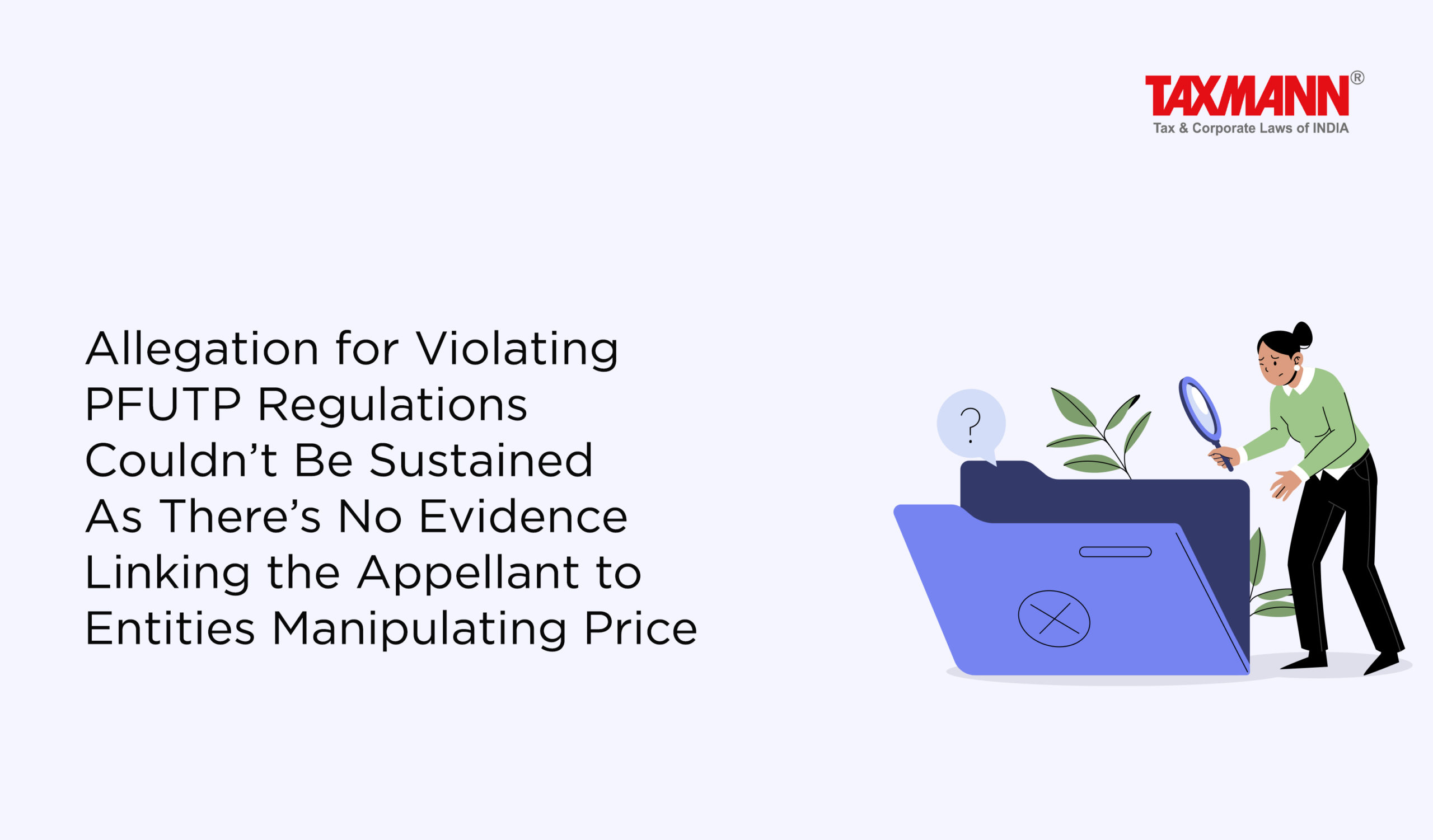Allegation for Violating PFUTP Regulations Couldn’t Be Sustained As There’s No Evidence Linking the Appellant to Entities Manipulating Price
- News|Blog|Company Law|
- 2 Min Read
- By Taxmann
- |
- Last Updated on 28 August, 2023

Case Details: Abhinandan Jain v. Securities and Exchange Board of India - [2023] 153 taxmann.com 35 (SAT-Mumbai)
Judiciary and Counsel Details
-
- Justice Tarun Agarwala, Presiding Officer & Ms Meera Swarup, Technical Member
- CA Kushal Shah for the Appellant.
- Sumit Rai, Ravishekhar Pandey, Ms Shefali Shankar & Ms Rasika Ghate, Advs. for the Respondent.
Facts of the Case
In the instant cases, SEBI conducted an investigation in trading of certain entities in scrips of company ‘PFL’ wherein it was revealed that companies ‘ACI’ and ‘FIL’ were placing buy orders at a price substantially higher than the last traded price and, thus, deliberately and fraudulently increased price of scrip of ‘PFL’ to enable Chairman and Managing Director of company ‘PFL’ i.e. ‘P’ to offload shares at a higher price.
It was also alleged that the appellant was an Independent Director of the company and was alleged to be directly connected to entities that manipulated the price of the scrip of the very same company.
SEBI therefore, imposed a penalty of Rs. 10 lakhs on the appellant, ‘ACI’ and ‘FIL’ for alleged violation of regulations 3 and 4 of PFUTP Regulations and Rs. 1 lakh had been imposed for non-disclosure under SEBI, (Prohibition of Insider Trading) Regulations, 1992.
It was noted that admittedly, no trade was executed by the appellant and there was no finding that the appellant was manipulating the price of the scrip. Further, there was no finding that the appellant was conniving with ‘ACI’ and ‘FIL’ in manipulating price.
The SAT observed that in the absence of any such finding, the appellant could not be found guilty of price manipulation by ‘ACI’ and ‘FIL’ only on the ground that he was connected to them.
SAT Held
The SAT held that finding that the appellant had facilitated the offloading of shares by ‘P’ was patently erroneous and based on surmises and conjectures and merely because the appellant was known to ‘P’ could not lead to a conclusion that he facilitated the offloading of shares.
Thus, charges of alleged violation of PFUTP regulation against the appellant could not be sustained and the order of imposition of penalty upon the appellant was to be quashed.
Disclaimer: The content/information published on the website is only for general information of the user and shall not be construed as legal advice. While the Taxmann has exercised reasonable efforts to ensure the veracity of information/content published, Taxmann shall be under no liability in any manner whatsoever for incorrect information, if any.

Taxmann Publications has a dedicated in-house Research & Editorial Team. This team consists of a team of Chartered Accountants, Company Secretaries, and Lawyers. This team works under the guidance and supervision of editor-in-chief Mr Rakesh Bhargava.
The Research and Editorial Team is responsible for developing reliable and accurate content for the readers. The team follows the six-sigma approach to achieve the benchmark of zero error in its publications and research platforms. The team ensures that the following publication guidelines are thoroughly followed while developing the content:
- The statutory material is obtained only from the authorized and reliable sources
- All the latest developments in the judicial and legislative fields are covered
- Prepare the analytical write-ups on current, controversial, and important issues to help the readers to understand the concept and its implications
- Every content published by Taxmann is complete, accurate and lucid
- All evidence-based statements are supported with proper reference to Section, Circular No., Notification No. or citations
- The golden rules of grammar, style and consistency are thoroughly followed
- Font and size that’s easy to read and remain consistent across all imprint and digital publications are applied



 CA | CS | CMA
CA | CS | CMA
